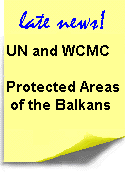- which environmental issues are the highest priority
- what information is required to support decisions on these issues (content)
- what long-term information and monitoring programmes are required, and who is responsible for implementing them
- which audiences require information most urgently, and how best to reach them (delivery)
- how and when information should be presented (format and timeliness)
- which data collection and management standards will be followed
- what mechanisms are required for data exchange and cost recovery (eg `Memoranda of Understanding')
- what are the main capacity building needs (eg technical and human resources).
 |
The World Conservation Monitoring Centre provides information services on conservation and sustainable use of the world's living resources, and helps others to develop information systems of their own.
|
Capacity Building Services
WCMC welcomes the opportunity to support others in the development of information systems for biodiversity conservation and sustainable use of biological resources. We are able to provide a variety of different services as described below. Each service description is followed by a summary of our typical staff and time requirements, plus an indication of the notice we require to deliver the service.
Workshop facilitation
Click here to see a typical workshop group
Click here to see a typical plenary session
Click here to see a typical working group session
Like all complex, multi-stakeholder issues, participation is central to the development of information systems. The latter should represent not only the people who design and operate them, but also the people to whom information is delivered. Involvement of many groups during the design and development process is an essential ingredient of success. Indeed, one of the primary characteristics of a successful information system is improved communication between the agencies and individuals concerned.
Workshops play an important role in bringing together the wider constituency of users to forge agreement on the complex issues which characterise information systems. Typical discussion topics might include:
Understandably, with so many potential topics to discuss an external facilitator can be useful in keeping workshop participants to an agreed agenda and moving discussions forward at appropriate points to cover essential ground. Further, particularly difficult issues can arise which are best dealt with by expert technical opinion. WCMC is able to provide both `facilitators' and `technical support' for national workshops on biodiversity information.
Summary: 2 staff, 3-5 days, 2 months notice.
Training
Click here to see a typical training course group
WCMC has developed a flexible training package suitable for delivery in-situ (at the host's office environment) or ex-situ at WCMC. We can also offer bench space to individuals seeking longer periods of contact - perhaps for specific tasks such as an information search, analysis of data, or learning about a new technique or approach.
Our training course is being developed in collaboration with leading universities and organisations in the United Kingdom, including the University of Bradford, the University of Cambridge (Department of Geography), the University of Hull, the University of Kent (Durrell Institute for Conservation and Ecology (DICE)), and the International Centre for Environmental Education (ICEE).
Summary: 2 staff, 5 days full course (3 sub-components of 1-2 days), 2 months notice.
Information needs assessment
A key step in many environmental projects is the analysis of strategic information requirements, and methods for information delivery. This process, which is often referred to as `information needs assessment' or `user needs analysis', helps to focus attention on essential information - i.e. the information required to set, achieve and review policy and management goals. Without attention to information needs assessment time and money can be wasted, and projects can be unfocused.
By drawing on its own expertise and that of organisations with which it has developed ties, WCMC can arrange assessments at a variety of scopes and levels. For example, a single environmental issue (e.g. the decline of a specific species or ecosystem) could be assessed for a resource management agency; an entire sector (e.g. forestry) could be assessed at the national level; or a multi-disciplinary programme (e.g. national conservation strategy) involving a wide range of issues and stakeholders could be assessed in co-operation with appropriate partners.
The usual product of an information needs assessment is one or more reports providing a strategic framework (information strategy) for environmental information systems development. Practical ways forward may be suggested, such as the establishment of monitoring programmes, data management facilities, publishing and communication facilities, or fora for consultation of stakeholders.
Summary: 2-3 staff, 1-3 weeks, 3 months notice.
Information system development
Following an assessment of information needs, WCMC can help arrange support for the design and development of the necessary information systems. This may involve helping to define the roles and responsibilities of different stakeholder groups; proposing organisational structures and reporting mechanisms to facilitate access to information; assisting in the acquisition and integration of computer equipment; helping to maintain standards of data quality; and facilitating access to international sources of data and expertise (e.g. via the Internet).
Summary: 1-3 staff, 1-3 weeks, 3 months notice.
|
For further information please write to: Head of Capacity Building, World Conservation Monitoring Centre, 219 Huntingdon Road, Cambridge CB3 0DL, United Kingdom. Tel: +44 1223 277314; Fax: +44 1223 277136.
General e-mail: info@wcmc.org.uk Document URL: http:// www.wcmc.org.uk /capacity_building/services.htm Revision date: 30-July-1999 Current date: 21-January-2000 |
 |
|||
 Home Home |
 Comments Comments |
© WCMC | ||